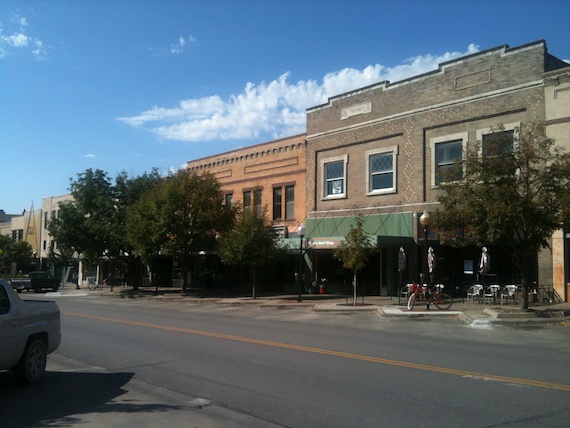
The main street, Lawrence, Kansas.
I was in Lawrence, Kansas this week, giving a lecture at the University of Kansas at the invitation of one of my former tutors from Oxford who is now Professor of History there. And it got me to thinking about American National Identity, especially – and you’ll not be surprised to hear me say this – in the context of WW2.
I’ve worked a lot in America over the last thirty years, but there is something particularly insightful about a visit to a small town like Lawrence. Coming from London one is astonished at the friendliness of most people in this part of middle America.
To give just one example from last week, I was looking to buy some toothpaste and, since the main street of Lawrence is now given over to boutiques and restaurants, finding some within walking distance of my hotel was clearly going to be a challenge. But everyone I asked was anxious to help me. One waitress went in search of her manager and both had a long discussion with me on the sidewalk about whether there was a drugstore near enough for me to get to. ‘There was one on the corner until last year,’ the manager said, ‘but it’s not there now. We ought to do something about getting one back here, downtown.’ The barista in Starbucks was equally keen to chat – also filling me in at length on the demise of the local drug store – before finally saying to me: ‘You’re not from round here, are you?’
The next morning, when I left the hotel, at least three separate people who I had chatted to about my search for toothpaste the previous day waved good morning to me. Being anonymous in London is easy. Anonymous in Lawrence quite impossible.
Any discussion about National Identity leads to generalizations, every historian knows that. But widespread travel tells us that there is such a thing as National Identity – visit Japan if you don’t believe me. And the various component parts of American National Identity I detected over the years in places like Lawrence – friendliness, optimism, self-confidence – was exactly how many British people described American GIs when they came to Britain during the war. But there is something else, which you don’t discover unless you cross these people. Which is a ruthless belief that right is on their side, and that they will pursue to the last anyone who attacks them and their fundamental, unshakable values.
The Japanese found that out during WW2. Their government had believed that after the humiliation of Pearl Harbor, America would seek some kind of compromise peace. But anyone who knew the American National Identity was aware that judgment was devastatingly flawed. Convinced that righteousness was on their side, armed with a total absence of self-doubt, the Americans would fight to the bitter end.
 Twitter
Twitter





